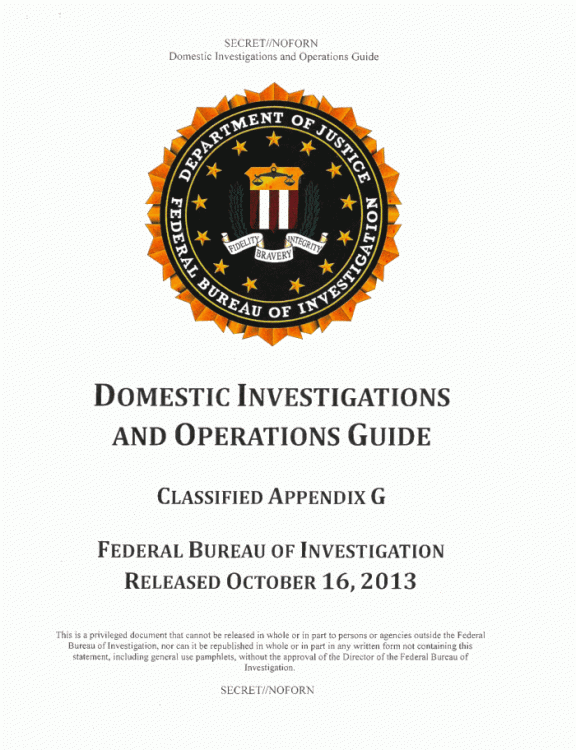
Secret FBI rules allow agents to obtain journalists’ phone records with approval from two internal officials — far less oversight than under normal judicial procedures.
The classified rules, obtained by The Intercept and dating from 2013, govern the FBI’s use of national security letters, which allow the bureau to obtain information about journalists’ calls without going to a judge or informing the news organization being targeted. They have previously been released only in heavily redacted form.
Media advocates said the documents show that the FBI imposes few constraints on itself when it bypasses the requirement to go to court and obtain subpoenas or search warrants before accessing journalists’ information.
The rules stipulate that obtaining a journalist’s records with a national security letter requires the signoff of the FBI’s general counsel and the executive assistant director of the bureau’s National Security Branch, in addition to the regular chain of approval. Generally speaking, there are a variety of FBI officials, including the agents in charge of field offices, who can sign off that an NSL is “relevant” to a national security investigation.
There is an extra step under the rules if the NSL targets a journalist in order “to identify confidential news media sources.” In that case, the general counsel and the executive assistant director must first consult with the assistant attorney general for the Justice Department’s National Security Division.
But if the NSL is trying to identify a leaker by targeting the records of the potential source, and not the journalist, the Justice Department doesn’t need to be involved.
The guidelines also specify that the extra oversight layers do not apply if the journalist is believed to be a spy or is part of a news organization “associated with a foreign intelligence service” or “otherwise acting on behalf of a foreign power.” Unless, again, the purpose is to identify a leak, in which case the general counsel and executive assistant director must approve the request.
“These supposed rules are incredibly weak and almost nonexistent — as long as they have that second sign-off, they’re basically good to go,” said Trevor Timm, executive director of the Freedom of the Press Foundation, which has sued the Justice Department for the release of these rules. “The FBI is entirely able to go after journalists and with only one extra hoop they have to jump through.”
A spokesperson for the FBI, Christopher Allen, declined to comment on the rules or say if they had been changed since 2013, except to say that they are “very clear” that “the FBI cannot predicate investigative activity solely on the exercise of First Amendment rights.”
The Obama administration has come under criticism for bringing a record number of leak prosecutions and aggressively targeting journalists in the process. In 2013, after it came out that the Justice Department had secretly seized records from phone lines at the Associated Press and surveilled Fox News reporter James Rosen, then-Attorney General Eric Holder tightened the rules for when prosecutors could go after journalists. The new policies emphasized that reporters would not be prosecuted for “newsgathering activities,” and that the government would “seek evidence from or involving the news media” as a “last resort” and an “extraordinary measure.” The FBI could not label reporters as co-conspirators in order to try to identify their sources — as had happened with Rosen — and it became more difficult to get journalists’ phone records without notifying the news organization first.
Yet these changes did not apply to NSLs. Those are governed by a separate set of rules, laid out in a classified annex to the FBI’s operating manual, known as the Domestic Investigations and Operations Guide, or DIOG. The full version of that guide, including the classified annex, was last made public in redacted form in 2011.
The section of the annex on NSLs obtained by The Intercept dates from October 2013 and is marked “last updated October 2011.” It is classified as secret with an additional restriction against distribution to any non-U.S. citizens.
Emails from FBI lawyers in 2015, which were released earlier this year to the Freedom of the Press Foundation, reference an update to this portion of the DIOG, but it is not clear from the heavily redacted emails what changes were actually made.
In a January 2015 email to a number of FBI employee lists, James Baker, the general counsel of the FBI, attached the new attorney general’s policy and wrote that “with the increased focus on media issues,” the FBI and Justice Department would “continue to review the DIOG and other internal policy guides to determine if additional changes or requirements are necessary.”
“Please be mindful of these media issues,” he continued, and advised consulting with the general counsel’s office “prior to implementing any techniques targeting the media.” But the email also explicitly notes that the new guidelines do not apply to “national security tools.”
Allen, the FBI spokesperson, told The Intercept in an emailed statement that “the FBI periodically reviews and updates the DIOG as needed” and that “certainly the FBI’s DIOG remains consistent with all [attorney general] guidelines.”
Bruce Brown, executive director of the Reporters Committee for Freedom of the Press, said that the “use of NSLs as a way around the protections in the guidelines is a serious concern for news organizations.”
Last week, the Reporters Committee filed a brief in support of the Freedom of the Press Foundation’s lawsuit for the FBI’s NSL rules and other documents on behalf of 37 news organizations, including The Intercept’s publisher, First Look Media. (First Look also provides funding to both the Reporters Committee and the Freedom of the Press Foundation, and several Intercept staffers serve on the foundation’s board.)
Seeing the rules in their uncensored form, Timm, of the Freedom of the Press Foundation, said that the FBI should not have kept them classified.
“Redacting the fact that they need a little extra sign-off from supervisors doesn’t come close to protecting state secrets,” he said.
The FBI issues thousands of NSLs each year, including nearly 13,000 in 2015. Over the years, a series of inspector general reports foundsignificant problems with their use, yet the FBI is currently pushing to expand the types of information it can demand with an NSL. The scope of NSLs has long been limited to basic subscriber information and toll billing information — which number called which, when, and for how long — as well as some financial and banking records. But the FBI had made a habit of asking companies to hand over more revealing data on internet usage, which could include email header information (though not the subject lines or content of emails) and browsing history. The 2013 NSL rules for the media only mention telephone toll records.
Another controversial aspect of NSLs is that they come with a gag order preventing companies from disclosing even the fact that they’ve received one. Court challenges and legislative changes have loosened that restriction a bit, allowing companies to disclose how many NSLs they receive, in broad ranges, and in a few cases, to describe the materials the FBI had demanded of them in more detail. Earlier this month, Yahoo became the first company to release three NSLs it had received in recent years.
It’s unclear how often the FBI has used NSLs to get journalists’ records. Barton Gellman, of the Washington Post, has said that he was told his phone records had been obtained via an NSL.
The FBI could also potentially demand journalists’ information through an application to the Foreign Intelligence Surveillance Court (or FISA court), which, like NSLs, would also not be covered by the Justice Department policy. The rules for that process are still obscure. The emails about revisions to the FBI guidelines reference a “FISA portion,” but most of the discussion is redacted.
For Brown, of the Reporters Committee, the disclosure of the rules “only confirms that we need information about the actual frequency and context of NSL practice relating to news-gathering and journalists’ records to assess the effectiveness of the new guidelines.”
3 WAYS TO SHOW YOUR SUPPORT
- Log in to post comments












